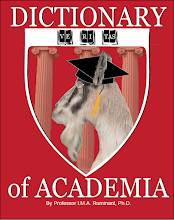UT Administration Seeking More Visionary Ideas.
Friday, December 20, 2013
Tuesday, December 17, 2013
Monday, December 2, 2013
Tuesday, November 5, 2013
Thursday, October 24, 2013
Monday, October 7, 2013
UT Dammerung
You of course realize, Dear Reader, that the Jacobs' Era at UT parallels, frighteningly, Richard Wagner's operatic Ring cycle. Bloggie invites further comparisons, but here are some of the tragic essentials:

From a fissure emerges Alberich, sometimes described as a slimy sulphurous dwarf. He lusts after the Rhinemaidens and pursues them, each in turn.
In the beginning the Rhinemaidens (faculty) who watched over the Rhinegold (the treasures of education) are swimming around at the bottom of the Rhine River (Maumee?) keeping watch over the Rhinegold, their eternal task. They are scatter-brained but innocent creatures, and, we must admit, a lot better-looking than most faculty, but there they are, a'singing and a'swimming. This went on for a very long time.

From a fissure emerges Alberich, sometimes described as a slimy sulphurous dwarf. He lusts after the Rhinemaidens and pursues them, each in turn.
The Rhinemaidens, who perhaps are a bit too artsy and pretentious for their own good, taunt and reject Alberich, who as a dwarf represents the so-called business or vocational model of education, as dwarfs manufacture things and have a very vocational outlook on life, that is when they can't get their hands on any hot Rhinemaidens, and especially after a humiliating rejection.
 |
Alberich, frustrated, denounces Love and steals the Rheingold. The Rhinemaidens sing "O Weh, Oh Weh, Oh Weh," which is about all they have been doing now for the past several years.
Without attempting to summarize almost 20 hours of operatic entanglement, involving incest, cronyism, searchless hires, a dragon, giants and questionable spending, the stolen Rheingold empowers and justifies various mercurial administrative transmutations of what was once a higher educational mission. Eventually the Gods use it to finance and justify the building of Valhalla, a classy new refurbished administrative palace, a bureaucratic structure that houses at least 40 Gods and Vice Presidents and their minions. The transmutations include The New Entity, The Cloud University and Strategic Planning for the Sake of Strategic Planning.
There is even a nifty Rainbow Bridge over which the Gods commute to work. A Rainbow Parking Lot is under construction.
Provost and Vice President Loki (Logi) urges the bereft Rhinemaidens not to worry, even though their Rhingold is gone: After a 72-slide Powerpoint prestentation, he assures them that henceforth they can bask in the newfound radiance of the Gods/adminstrators/BOT. The Rhinemaidens can be heard far off singing plaintively, in minor key, "Rheingold, Rheingold, Rheingold" as the glorious Gods pass over the Rainbow Bridge to administrative Valhalla.
The Rhinemaidens fail at persuading VP Seigfried to return their gold. He refuses and comes to a bad end.
The end of course is Gotterdammerung, Twilight of the Gods, where the funeral pyre of Seigfried catches alight Valahala, and the Rhinemaidens get their gold back. This occurs through no fault of their own,it should be mentioned, and is owing entirely to general administrative incompetence.
Wednesday, September 4, 2013
Thursday, August 29, 2013
Wednesday, August 28, 2013
Monday, August 26, 2013
Proposal Tanks
Tanks a Lot!
The Joint Committee wants to thank Bloggie and those readers
who participated in the two “UT Degree Guarantee” proposal surveys. We have we
have kicked around the significance of the survey results also have carefully
have read over the many “Comments” in response to the proposal. The initial
week-long survey showed that there was strong but far from unanimous support
for the proposal. So the survey deadline was extended a week. In the second
survey the proposal got hammered.
The Joint Committee has concluded from the comments that
opponents of the proposal shared a general animosity toward new proposals. Some
of the Committee members conclude that opponents of the proposal rejected it on
principle and are disappointed that there was no evidence and that they had
bothered to study the merits of the proposal in any great depth.
The Committee acknowledges that there is a “new proposal
fatigue” that presently prevails across campus. It is a rare day when the UT
campus community is asked to vote on a significant new proposal. We observe,
for example, that the decision to serve beer at football games was imposed from
above and never a topic widely discussed or voted on prior to implementation.
That is the just way things are done around here and nobody
seems to care. Oligarchy prevails. This “UT Degree Guarantee” proposal is now
dead in the water.
Monday, August 12, 2013
Public Comments Requested/Poll
THE UT DEGREE GUARANTEE™
Responding
to deepening student and parental concerns about economic security and unsustainable
debt loads consequent to higher education, University of Toledo’s Joint Academic
Committee proposes a program innovation: The UT Degree Guarantee™.
The
UT Degree Guarantee™ warrants the marketability of a UT degree. The University enters
into a contract with the student whereupon, if the student satisfies the conditions
enumerated below, in the event of being unable to find a job in his or her chosen
educational field, the University will make the payments on the student’s
educational loan indebtedness until such suitable employment is achieved.
The
program offers a number of incentives designed to accommodate committed
students. By selecting for highly motivated, productive students, the program
assures its own long-range success:
- Students must volunteer and sign a memorandum of understanding to demonstrate commitment, diligence, consistency, and compliance with appropriate levels of academic performance.
- The University must aggressively and in good faith seek meaningful, appropriate job placement locally, regionally or in-state for contracting graduating students.
- Guaranteed jobs must be local, regional or in-state, in this order of emphasis.
- Student educational goals, university coursework and labor market demand matches must be data-driven and transparent at the time the contract is signed. An agreed-upon plan of study reflecting these realities must be implemented and pursued.
- The student must maintain a 3.0 overall GPA with acceptable progress toward graduation (a record of completed classes and full time equivalence)
- Students must, prior to entering into the agreement, undergo the Strengthquest aptitude process as offered by the Gallup firm, and which will be made available on the UT campus, as administered by certified UT faculty members, an aptitude metric now is use at a number of top rated universities and business schools.
- UT Degree Guarantee™ students must also make use of UT career services, specifically in the areas of resume writing, networking, and interviewing skills. These include pursuit in good faith of internship opportunities posted at the department and other levels within the university.
- Graduates must demonstrate good faith efforts at obtaining employment.
- Changes in contracted student career goals are grounds for mutual renegotiation or termination of the contract.
- Freshmen enrolled on the UT Guarantee™ track must negotiate the contract at the completion of 60 credit hours of progress toward the degree, if they have maintained eligibility
- UT Guarantee™-track students must meet regularly with special “guarantee” advisors
- Transfer students are not eligible to participate in the contracted job guarantee program
The
program would be launched as an “experimental” program, and closely monitored
via a formal formative evaluation process.
Returns can be plowed back into costs and scholarships for contracted
students in the program.
Owing
to the highly motivated nature of the students (and their parents) involved in
the program, providing the program is properly monitored in its formative
stages, it is most unlikely that the UT Guarantee™ graduates will prove a
financial burden to the University. Quite the reverse, would be expected. Moreover it would incentivize students (and
parents) by removing much of the anxiety partial to the inevitable costs of higher
education in the U.S.
The
program would establish a reputation for UT, a unique market position, while
enhancing the marketability of the UT degree.
Subscribe to:
Posts (Atom)

















